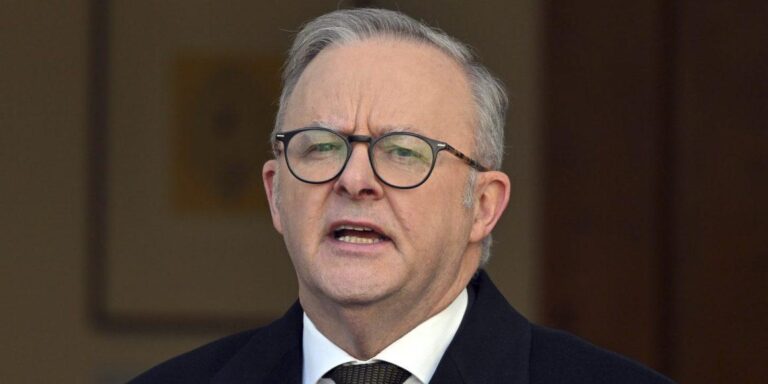In the midst of escalating global uncertainty, Australian Prime Minister Anthony Albanese is charting a steady and pragmatic course on the world stage. From high-level engagements in New York to strategic dialogues in London, Albanese is positioning himself as a statesman navigating complex international challenges. As crises unfold from geopolitical tensions to economic instability, his approach signals a commitment to measured diplomacy and alliance-building, reinforcing Australia’s role in an increasingly volatile global landscape.
Anthony Albanese Navigates Complex Diplomatic Landscape Amid Global Uncertainty
As Anthony Albanese tours key global capitals, his diplomatic strategy underscores a blend of pragmatism and vision. From engaging with the United Nations in New York to strengthening the historic ties in London, the Australian Prime Minister is threading a delicate needle amid the escalating geopolitical tensions. His approach focuses on reinforcing allied partnerships while advocating for resilient multilateral frameworks to address pressing challenges such as climate change, security threats, and economic instability.
Key elements of Albanese’s foreign policy maneuvering include:
- Climate commitments: Promoting actionable targets aligned with global goals, emphasizing renewable energy collaborations.
- Trade relations: Expanding bilateral agreements to diversify markets and reduce dependency on volatile regions.
- Security alliances: Deepening intelligence-sharing initiatives, particularly in the Indo-Pacific sphere.
| Focus Area | Key Initiative | Expected Outcome |
|---|---|---|
| Energy | Joint solar projects | Reduction in carbon footprint |
| Trade | New export corridors | Diversified markets |
| Security | Enhanced maritime patrols | Strengthened regional stability |
Strategic Alliances and Economic Partnerships Shape Australia’s Forward-Looking Foreign Policy
Australia’s foreign policy under Anthony Albanese is marked by a sophisticated embrace of strategic alliances and economic partnerships designed to fortify its position amid global uncertainty. Recognizing the shifts in geopolitical power, Albanese has actively sought to deepen ties with key players such as the United States, the United Kingdom, and the Indo-Pacific bloc. These relationships are not merely symbolic but are backed by concrete initiatives ranging from defense collaborations to trade negotiations that aim to diversify Australia’s economic dependencies.
Central to this approach are targeted agreements that balance security imperatives with commercial interests. The recent rounds of dialogue highlight commitments to:
- Enhanced military interoperability within the AUKUS partnership
- Expanding bilateral trade frameworks beyond traditional markets
- Joint innovation ventures in clean energy and digital technology
These efforts are encapsulated in the following strategic overview:
| Focus Area | Key Partners | Primary Goals |
|---|---|---|
| Defense & Security | USA, UK, Japan | Strengthen regional deterrence capabilities |
| Trade & Economics | ASEAN, EU, UK | Diversify trade portfolios, reduce supply chain risks |
| Innovation & Sustainability | EU, Canada | Co-develop green technology and digital infrastructure |
Recommendations for Strengthening International Cooperation in Times of Geopolitical Turbulence
To navigate the complexities of today’s geopolitical challenges, nations must embrace multilateralism with renewed vigor. Strengthening existing alliances and establishing new dialogue platforms are essential steps toward mitigating conflicts and fostering mutual understanding. These efforts should focus on:
- Enhancing transparency in diplomatic communications to reduce mistrust.
- Promoting inclusive frameworks that engage emerging powers alongside traditional stakeholders.
- Investing in conflict prevention mechanisms that prioritize early intervention and mediation.
Additionally, effective information-sharing and coordinated policy responses are vital. A comparative snapshot of key cooperation mechanisms highlights their core strengths and areas for improvement:
| Framework | Strength | Improvement Needed |
|---|---|---|
| United Nations | Global legitimacy and broad membership | Streamlined decision-making processes |
| G20 | Economic policy coordination | Greater inclusivity beyond major economies |
| ASEAN | Regional conflict resolution | Enhanced enforcement mechanisms |
In Retrospect
As Anthony Albanese navigates a world marked by geopolitical uncertainty and economic challenges, his measured approach signals Australia’s intent to engage as a steady and reliable partner on the global stage. From New York to London, his efforts underscore a commitment to diplomacy and strategic collaboration, positioning Canberra to weather international turbulence with a statesmanlike resolve. Observers will be watching closely to see how this course shapes Australia’s role in an increasingly complex international landscape.




